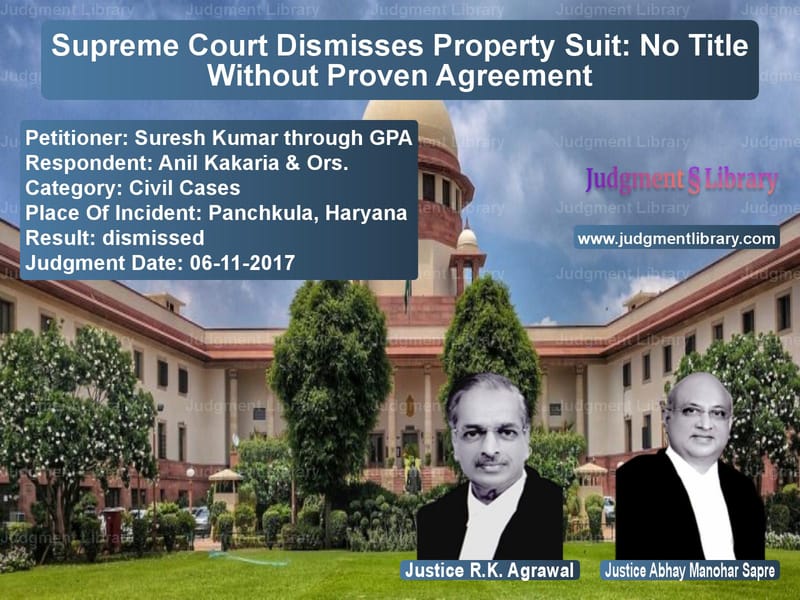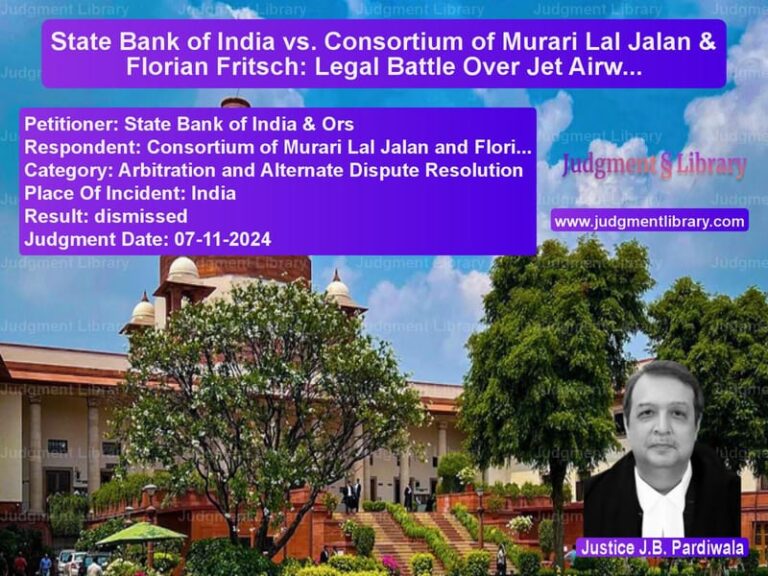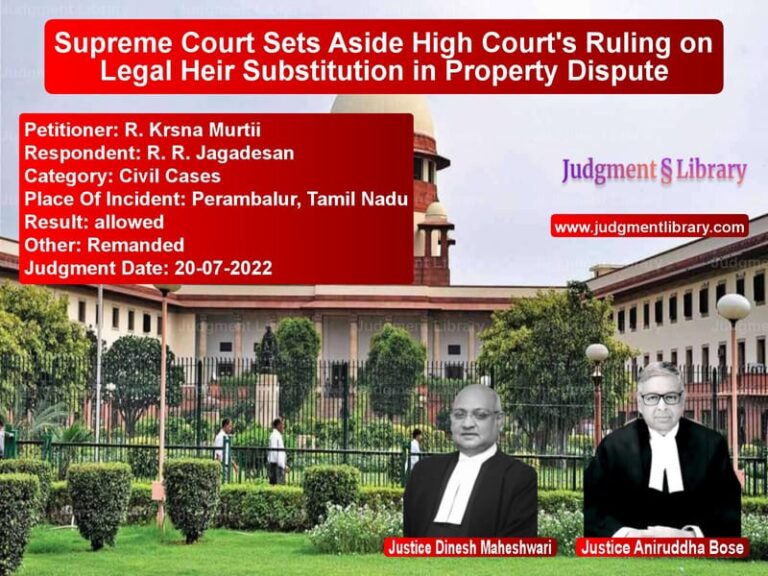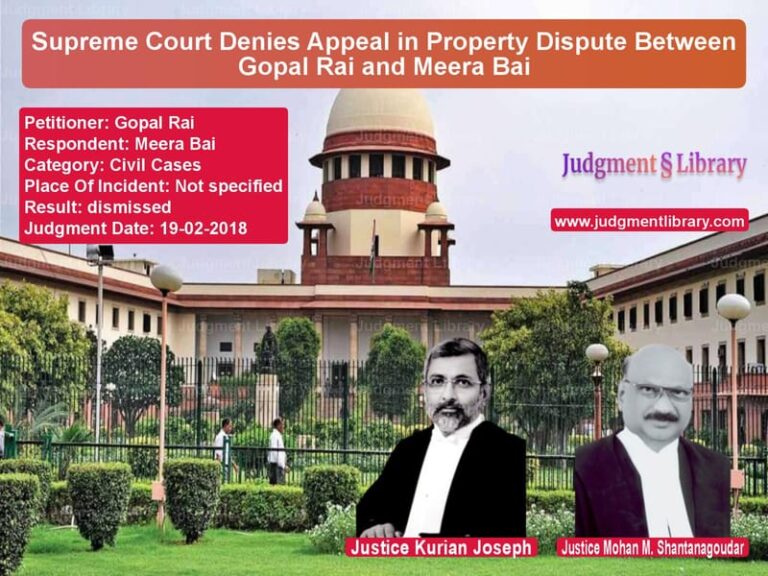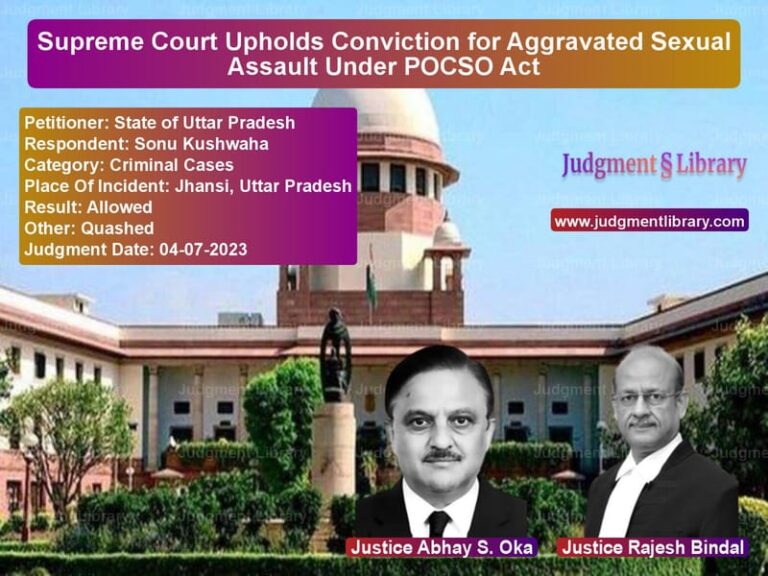Supreme Court Dismisses Property Suit: No Title Without Proven Agreement
The Supreme Court of India recently ruled on the case of Suresh Kumar through GPA vs. Anil Kakaria & Ors., addressing a property dispute involving claims of ownership based on an unproven agreement and will. The appellant, Suresh Kumar, sought to invalidate a property transfer made by the legal heirs of the original owner, claiming his right over the property based on an agreement executed in 1980. The Supreme Court upheld the decisions of three lower courts, dismissing the appellant’s claims and reinforcing the importance of proving legal ownership.
Background of the Case
The case revolves around a property dispute concerning Plot No. 28, measuring 1/4th acre in Industrial Area Phase-I, Urban Estate, Panchkula. Originally, the plot was allotted by the Haryana Urban Development Authority (HUDA) to Ved Prakash Kakaria in 1973. The appellant, Suresh Kumar, claimed that he had entered into an agreement to purchase the land from the owner on 24.04.1980.
However, following the death of Ved Prakash Kakaria in 1985, his legal heirs (respondents 1 to 3) sold the land to another party (respondent 4). The appellant then filed a suit against all respondents, seeking:
- A declaration that the sale made by the heirs in favor of respondent 4 was null and void.
- A restraining order preventing the respondents from interfering with his possession of the land.
- A mandatory injunction directing the legal heirs to transfer the property to him.
Arguments of the Petitioner (Appellant)
- The appellant contended that he had entered into a valid agreement to purchase the land from Ved Prakash Kakaria in 1980.
- He also claimed that Kakaria had executed a Will in his favor.
- The appellant asserted that since he had been in possession of the property, the legal heirs had no right to transfer it to another party.
Arguments of the Respondents
- The respondents denied the existence of any agreement between the appellant and the original owner.
- They also contested the validity of the alleged Will, arguing that the deceased owner had left behind legal heirs who were entitled to the property.
- The legal heirs maintained that they had the full right to sell the land, and they had transferred it for valid consideration.
- The buyer (respondent 4) had set up a factory on the land and was in lawful possession.
Findings of the Trial Court
The Trial Court ruled against the appellant, making the following key observations:
- The appellant failed to prove the existence of the agreement dated 24.04.1980.
- The alleged Will in favor of the appellant was also not proven.
- The legal heirs (respondents 1-3) were entitled to sell the property.
- Respondent 4, the purchaser, had valid possession and had set up a factory on the land.
On this basis, the Trial Court dismissed the suit.
Decision of the First Appellate Court
The appellant challenged the Trial Court’s ruling in the Additional District Judge’s Court, Panchkula. However, the First Appellate Court upheld the judgment, affirming that:
- The appellant had no legal title over the property.
- The sale made by the legal heirs was valid.
- The claim of ownership based on the alleged agreement and will was not supported by evidence.
High Court’s Decision
The appellant further appealed to the Punjab and Haryana High Court, which dismissed the second appeal, stating:
- The findings of fact by the lower courts were binding on the High Court.
- The case did not involve any substantial question of law that warranted interference under Section 100 of the Code of Civil Procedure.
Supreme Court’s Judgment
The Supreme Court agreed with the lower courts and dismissed the appeal, making the following key observations:
1. Lack of Proven Ownership
The Supreme Court held that the appellant failed to establish ownership over the property, stating:
“The appellant had no title to the suit land. All that he had claimed to possess in relation to the suit land was an agreement dated 24.04.1980, which he failed to prove.”
2. Failure to File Suit for Specific Performance
The Court noted that if the appellant had a legitimate agreement, he should have filed a suit for specific performance within three years of the agreement. Instead, he filed a declaration suit 12 years later, which was improper.
3. Suit Barred by Limitation
The Court ruled that the suit was hopelessly barred by limitation, as it was filed long after the execution of the alleged agreement.
4. No Evidence of a Valid Will
The appellant claimed ownership through a Will executed by the deceased owner. However, the Court found no evidence to support this claim:
“Even the Will was rightly held not proved by the Courts below… Why should a deceased person leave a Will in favor of a third party when he had legal heirs?”
Conclusion
The Supreme Court’s judgment reinforces the principle that property ownership must be backed by legal documents and evidence. It highlights the importance of:
- Filing a suit for specific performance in a timely manner.
- Providing clear proof of agreements and wills when claiming ownership.
- Recognizing that legal heirs have the primary right to inherited property.
By dismissing the appeal, the Supreme Court upheld the validity of ownership transfers made by legal heirs and prevented baseless claims from disrupting rightful property transactions.
Don’t miss out on the full details! Download the complete judgment in PDF format below and gain valuable insights instantly!
Download Judgment: Suresh Kumar through vs Anil Kakaria & Ors. Supreme Court of India Judgment Dated 06-11-2017.pdf
Direct Downlaod Judgment: Direct downlaod this Judgment
See all petitions in Property Disputes
See all petitions in Specific Performance
See all petitions in Contract Disputes
See all petitions in Judgment by R K Agrawal
See all petitions in Judgment by Abhay Manohar Sapre
See all petitions in dismissed
See all petitions in supreme court of India judgments November 2017
See all petitions in 2017 judgments
See all posts in Civil Cases Category
See all allowed petitions in Civil Cases Category
See all Dismissed petitions in Civil Cases Category
See all partially allowed petitions in Civil Cases Category

